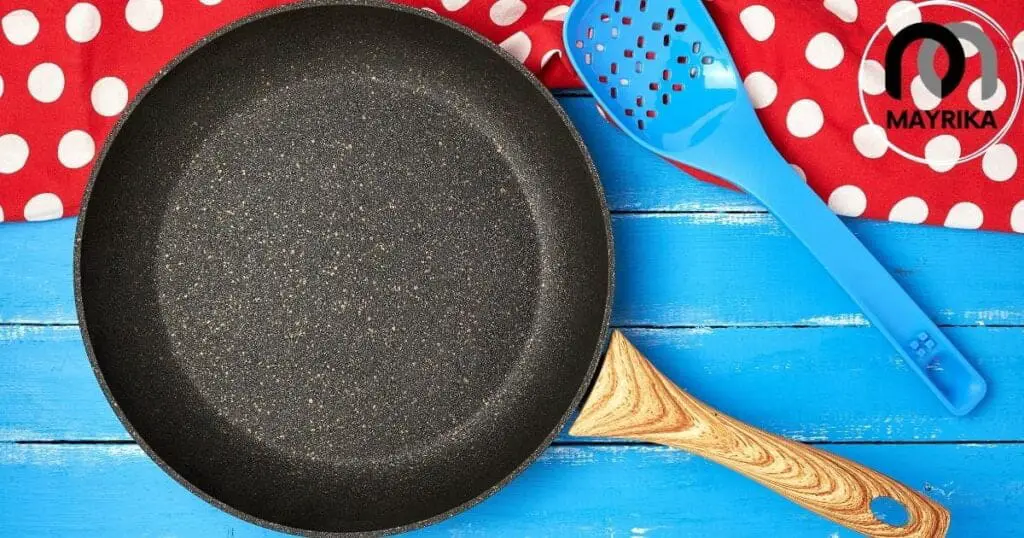Non-stick pans are a common household item. They are useful because they make cooking easier and they are easy to clean.
However, over time the non-stick coating on the pan can wear off. When this happens, the pan becomes difficult to clean and food can stick to it.
In this article, we will show you how to restore a non-stick pan.
What is a non-stick pan?
A non-stick pan is a kitchen cooking pan coated with a chemically bonded layer of polymer that prevents food from sticking to the pan.
Non-stick pans are used for cooking eggs, pancakes, and other foods that are prone to sticking.
The non-stick coating is often made of polytetrafluoroethylene (PTFE), which is a fluoropolymer.
PTFE is a very slippery material that has a low coefficient of friction. This makes it ideal for non-stick coatings.
Non-stick pans are not just for cooking eggs and pancakes. They can be used for any type of cooking where you do not want the food to stick to the pan.

What causes non-stick pans to wear out?
Non-stick cookware is very popular because it is so easy to use and clean. However, it does have a downside.
Over time, the non-stick coating can wear out and start to peel. This can happen for a number of reasons.
First, if you use metal utensils on your non-stick pan, they can scratch the surface and damage the coating.
Second, if you use your pan to cook at high temperatures, the coating can start to break down.
Finally, if you don’t clean your pan properly, the build-up of grease and food can also lead to the deterioration of the non-stick coating.
If you want your pan to last, it’s important to be careful with it and to clean it regularly.
How to prevent your non-stick pan from getting chipped
To prevent your non-stick pan from getting chipped, there are a few things you can do.
First, avoid using metal utensils on the pan, as they can cause scratching. Second, be careful not to overheat the pan, as this can also lead to damage.
Finally, make sure to wash the pan gently by hand, using a soft sponge or cloth.
By following these simple tips, you can keep your non-stick pan in good condition for years to come.
How to restore nonstick pans quickly & easily
If your nonstick pan is starting to look a little worse for wear, don’t despair – there’s an easy way to restore it to its former glory.
All you need is a little elbow grease and a few common household ingredients.
First, start by scrubbing the pan with a soft sponge or cloth and some warm, soapy water.
If there are any stubborn bits of food or grease, you can use a nonabrasive cleanser like baking soda or vinegar to help loosen them.
Once the pan is clean, rinse it well and dry it with a soft towel.
Next, it’s time to season the pan. This will help create a barrier between the pan and the food, and will also make it easier to clean in the future.
You can use any type of oil for this – just make sure it has a high smoke point so it doesn’t burn.
Rub the oil evenly over the surface of the pan, then place it in a preheated oven and bake for 30 minutes. Allow the pan to cool completely before using it.
With a little bit of care, your nonstick pan will last for years to come.
How to maintain your nonstick pan properly
If you want your nonstick pan to last, it’s important to take care of it. Here are a few tips on how to keep your pan in good condition:
- Don’t use metal utensils. Wooden or plastic utensils are best.
- Don’t use abrasive cleaners. Instead, wipe the pan with a soft, damp cloth.
- Don’t put the pan in the dishwasher. Hand-washing is best.
- Don’t heat the pan empty. This can damage the nonstick coating.
- Don’t store the pan in a high-humidity environment. This can also damage the nonstick coating.
By following these simple tips, you can help your nonstick pan last for many years.
FAQs
How do you make non-stick pans non-stick again?
There are a few ways to make non-stick pans non-stick again. One way is to season them.
Seasoning a pan means coating it in a layer of fat that will protect the surface from sticking.
You can use olive oil, vegetable oil, or shortening. Another way to make a pan non-stick is to use a cooking spray.
A third way is to add a little bit of flour to the pan before cooking.
Why did my non-stick pan stop working?
There are a few reasons why your non-stick pan might have stopped working.
One possibility is that the coating on the pan has worn off, making it difficult for food to slide off.
Another possibility is that the pan has been overheated, causing the non-stick coating to release harmful chemicals.
If your non-stick pan isn’t working anymore, it’s best to replace it with a new one.
How do I know if my non-stick pan is ruined?
Non-stick pans are a popular choice for cooking because they are easy to use and clean.
However, if your non-stick pan is not properly cared for, the coating can become damaged and the pan can be ruined.
Here are a few tips on how to tell if your non-stick pan is ruined:
1. If the non-stick coating is peeling or flaking off, the pan is likely ruined.
2. If the pan has been overheated, the non-stick coating may melt or blister.
3. If there are black spots or streaks on the surface of the pan, it may be due to wear and tear and the pan may be ruined.
4. If food sticks to the surface of the pan even after being sprayed with cooking oil or coated in butter, then the pan is likely ruined and should be replaced.
Is it possible to recoat a nonstick pan?
Nonstick coatings are designed to be durable and long-lasting.
However, over time, they may start to wear or peel. If this happens, you can recoat the pan with a nonstick cooking spray.
Does vinegar ruin non-stick pans?
No, vinegar will not ruin non-stick pans. In fact, vinegar is a great way to clean nonstick pans and remove any built-up food or grease.
How long should a nonstick pan last?
Nonstick pans typically last for a few years, but the lifespan can vary depending on the quality of the pan and how often it is used.
Pans that are not well-made or that are used frequently may start to show signs of wear and tear after just a year or two.
Why are eggs sticking to my nonstick pan?
The eggs are sticking to your nonstick pan because they are coated in a layer of fat.
Nonstick surfaces work best when they are free of any debris or grease.
To prevent eggs from sticking, make sure that your pan is clean and dry before adding the cooking oil.
Does butter ruin nonstick pans?
No, butter does not ruin non-stick pans. In fact, using butter is a great way to prevent sticking and create a crispy crust on foods.
Do professional chefs use non-stick pans?
Some professional chefs do use non-stick pans, while others eschew them in favor of traditional stainless steel or cast iron pans. There are pros and cons to both options.
Non-stick pans are generally considered easier to use and clean, which can be a plus for busy chefs.
However, they can also be less durable than traditional pans, and the coating can wear off over time.
What is the best oil to use in a non-stick pan?
The best oil to use in a non-stick pan is light vegetable oil, such as canola or grapeseed.
You can also use olive oil, but it has a higher smoke point than other vegetable oils, so it may not be the best choice if you’re cooking at a high temperature.
Does baking soda ruin non-stick pans?
Baking soda will not ruin non-stick pans, but it can cause them to lose their non-stick properties over time.
For this reason, it is best to avoid using baking soda to clean non-stick pans. Instead, use a mild detergent and warm water.
Are non-stick pans cancerous?
There is no definitive answer to this question as the potential risks associated with non-stick pans are still being studied.
Some experts believe that the fumes released from non-stick pans when they are heated could potentially cause cancer, while others say that there is not enough evidence to support this claim.
If you are concerned about the potential risks, it is best to avoid using non-stick pans whenever possible.
What ruins a nonstick pan?
The biggest enemy of a nonstick pan is high heat. If you’re cooking at too high a temperature, the nonstick coating can start to break down and flake off.
So be sure to use low or moderate heat when cooking with a nonstick pan.
Is ceramic cookware better than non-stick?
There is no definitive answer to this question as both ceramic and non-stick cookware have their pros and cons.
Ceramic cookware is heavier than non-stick and can be more difficult to clean, but it is oven-safe and does not release harmful chemicals like some non-stick cookware.
Non-stick cookware is lighter and easier to clean but can release harmful chemicals if overheated.
What happens if you overheat a nonstick pan?
If you overheat a nonstick pan, the coating can start to break down and release toxic fumes.
It’s best to keep nonstick pans below the recommended cooking temperature, and never leave them unattended while cooking.
Does Teflon cause Alzheimer’s?
There is no scientific evidence that Teflon causes Alzheimer’s.
Some research has shown that Teflon can release harmful chemicals when heated, but it’s not clear if these chemicals can cause any health problems.
More research is needed to determine if there is a link between Teflon and Alzheimer’s.
Final Words
A non-stick pan is a great way to cook different foods and can be a big help in the kitchen.
However, over time, the non-stick coating can become damaged and lose its effectiveness, requiring you to replace the entire pan.
These pans can be quite expensive to replace, so we’ve decided to provide you with some tips on how to restore a non-stick pan and get the most out of it, even if the pan is already damaged.
We know that the kitchen is one of the most used areas in the house and can get pretty dirty, so we hope that this blog post helps you keep your kitchen in good shape while saving money at the same time!
